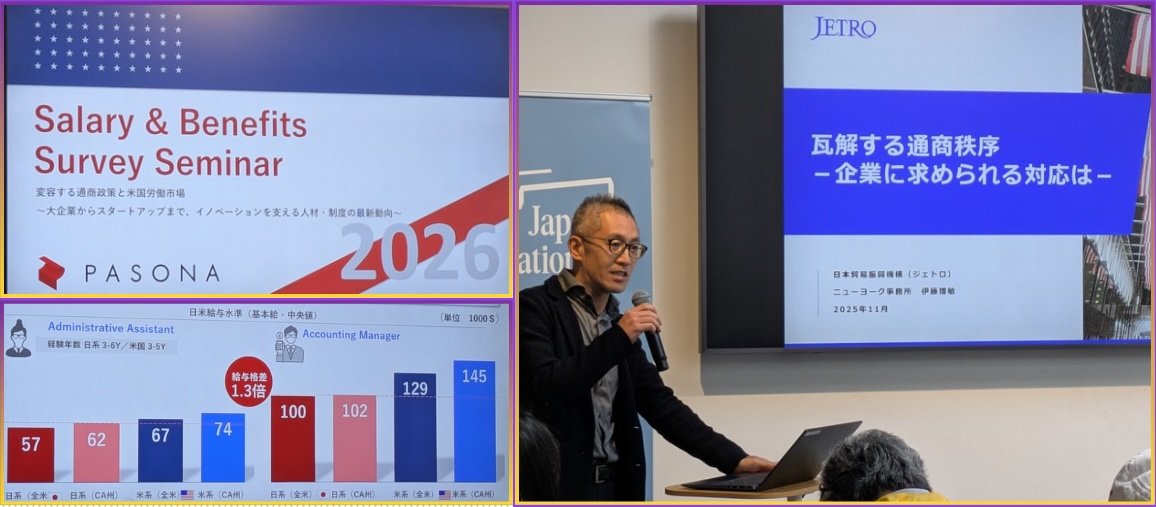Bridging Jinji人事 and U.S. HR: Current HR trends and challenges
I recently attended a joint event by Pasona and JETRO at the Japan Innovation Center. The entire program was conducted in Japanese, which made the JETRO segment on current trade and tariff issues quite complex. It was a deep dive into economic trends and policy updates, important, but definitely heavy material.
Fortunately, the Pasona session was right in my wheelhouse. They shared fascinating insights and current data on Japanese companies operating in the U.S., highlighting HR challenges and workforce trends. One of the most interesting points was about evaluation systems: many companies have implemented performance reviews, but these often focus narrowly on short-term results like salary adjustments and promotions. Pasona emphasized that evaluation should not be an end in itself, it should serve as a tool for growth and strategic execution.
Several other themes stood out:
Structural pay gaps remain a major challenge. U.S. companies often pay significantly more than Japanese firms for similar roles, and this gap is widening. Competitive compensation strategies are essential for attracting and retaining talent.
Optimizing promotion and reward systems is critical. Linking evaluations to long-term growth, performance-based pay, and role-based incentives can help companies move beyond short-term fixes and build sustainable talent pipelines.
Benefits and healthcare costs should be viewed as strategic investments, not just expenses. Companies that proactively manage cost-sharing, forecast increases, and implement wellness programs will be better positioned to control costs while supporting employee well-being.
Recruitment and retention require modernization. With turnover rates rising and talent shortages persisting, companies need to rethink hiring strategies and strengthen retention through engagement and career development.
Finally, don’t let compliance-driven management slow growth. HR should be a driver of organizational transformation, aligning talent strategies with business objectives and enabling agility.
The key takeaway? Japanese companies operating in the U.S. face a complex mix of challenges, performance management, benefits cost control, and competitive pay, all of which require a strategic HR approach. This reinforces what I’ve been seeing in the market: there’s still a strong need for HR consulting to help Japanese companies succeed in the U.S. environment. Cross-cultural talent management and organizational development aren’t just nice-to-haves, they’re critical for sustainable growth.
Need more help?
This is where Saske HR Ninja comes to the rescue!
サスケが御社の人事を陰からお支え致します。
How I can help:
この様な局面でのお手伝いをさせて頂きます。
🎯 Coaching & Training コーチングとトレーニング
I offer specialized coaching and HR-focused training tailored for Japanese managers (in English and Japanese). This helps them understand U.S. workplace expectations and effectively convey information without causing offense. 日本人マネージャー向けに特化したコーチングと人事に特化したトレーニングを英語と日本語で提供させて頂いております。これらは米国のビジネスにおいて各々が何を求められているかを正しく理解し、すれ違いや不快感を与える事なく効果的に意思疎通を図る為に有用な知識です。
🎯 Ongoing Support 継続的なサポート
I provide continuous resources and follow-up sessions to reinforce effective communication practices, ensuring lasting change. 効率的なコミュニケーションを強化、継続できる改善のためのサポートをさせて頂きます。
My support goes way beyond a 'box-ticking' exercise. I work closely with management to defuse current tensions and implement strategies that prevent future issues and costly lawsuits. 私の提供するサポートは単純な項目チェックだけに留まりません。経営陣の方々と密接に連携し現時点での緊張を緩和し、将来的な問題や多額の損失を伴う訴訟などを未然に防止する為の具体的な戦略を作成いたします。
If this situation resonates with you, don’t hesitate to reach out! I’d be happy to discuss how I can assist. まずはお気軽にお問い合わせください。喜んでご相談に応じさせて頂きます。


